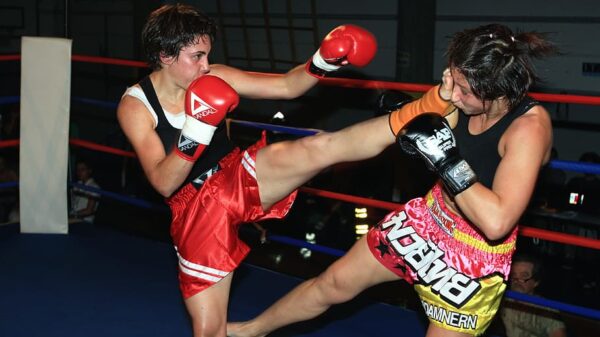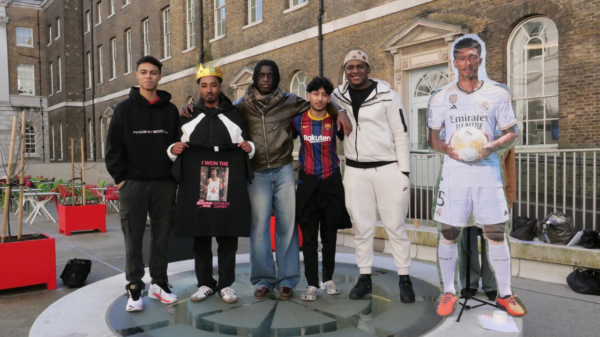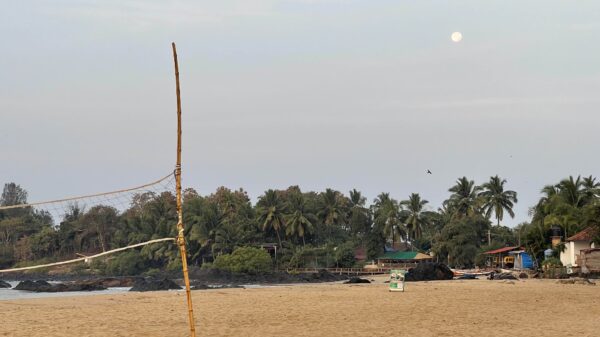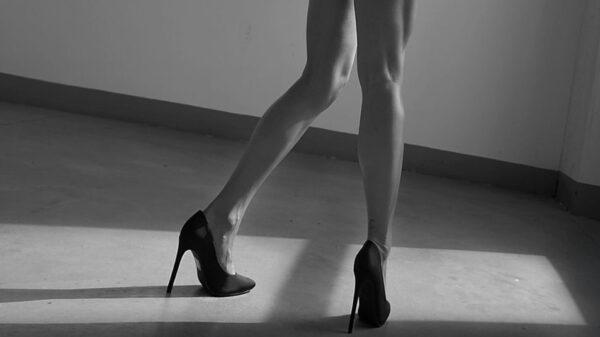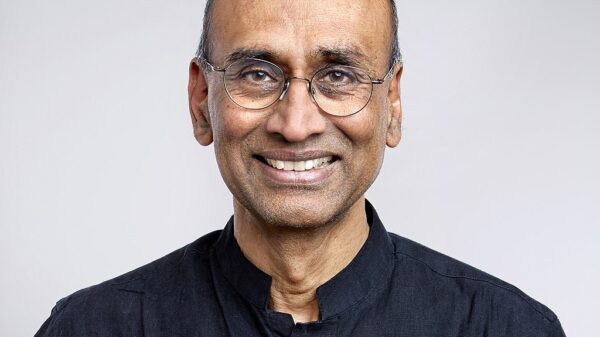“It almost becomes like a drug, doing daily news”, says George Parker, and despite being the political editor of the Financial Times since 2007, he is “still hooked”. If news is a drug, the year 2022 must have come close to an overdose. News Editor Ansel Bayly and Culture Editor Nia Simeonova sat down with Parker at the end of a year of four chancellors, three prime ministers, two monarchs, and a war in Europe. He shared his thoughts on his career to date, the current state of the media and politics, and where he thinks it’s all going.
A day in parliament
We meet George Parker on a busy day. The big news is that Sunak is unexpectedly announcing his response to the small boats crisis in The House of Commons. That day Parker is the only FT journalist in Parliament, it’s hard work but he loves it: “they’re quite long days, but every day is different. And people say, ‘well you’ve done that job for a long time’, but the job is changing all the time. Just this year, we’ve had three prime ministers, and I covered the queen’s death as well. So you don’t have time to get bored.”
A typical day can consist of “meetings with people, coffee with ministers, MPs, […] hanging around gossiping with people asking what’s going on. We cover press conferences, we sometimes go to Downing Street for briefings, then we sometimes spend time in the House of Commons chamber, reporting on statements or debates, and sometimes select committees.” As he leads us on a whistle-stop tour of Parliament, we get to experience that day-to-day whirlwind. He is greeted by a constant stream of gossip and banter, passers-by giving their take on the day’s events.
We head to the House of Commons for Sunak’s statement; the atmosphere in the chamber is restless. Parker is fascinated by the spectacle of Parliament: “Sometimes, going to the House of Commons chamber is like having the best seat in the theatre. Being in the House of Commons while Liz Truss has to sit there, while Jeremy Hunt rips up her entire strategy, and you look at her face, wondering what must be going through her mind, it’s like human theatre and it’s gripping.”
Early years
This fascination began, as these things often do, with his parents. His father was a local news journalist in Somerset, before working for Hansard, the House of Parliament reporting service. George Parker recalls, “when we were children we would come to the House of Commons, once or twice a year, to see where my dad works and we would go ‘wow, he works in this amazing palace’.” This experience, Parker states, was what first “planted” the seeds of a career in journalism.
Still set on journalism, Parker followed the advice of teachers and went to study geography at Queen Mary’s University. “Fortunately,” he notes, “a geography degree gives you plenty of spare time – without wishing to play into geography stereotypes too much – and for two years I was editor of the college newspaper, which was called ‘Cub’.” After taking a Master’s in journalism at City University, London, Parker began work at a local daily newspaper. It is his work in local news, Parker insists, that gave him the skills he uses to this day.
“We did everything,” he says, “council meetings, court cases, once or twice there were murders we had to cover, car crashes. All the things that local journalists have to do”. He goes on, “journalism like that is not really very different to the journalism I do now. All the principles are exactly the same – your job is to get as much information as you can and then tell it to everyone like you’re gossiping in the pub, in as interesting of a way as you can think of. That is really what I was doing when I was 22-23, and what I’m doing now.”
His big break came when he got the job as political correspondent for the local paper, based in the House of Commons. “Western Morning News shared an office with the Financial Times. The political editor was Robert Peston at the time. I got to know Robert a bit and when a job came up for number six on the FT political team, I applied and got it.”
“June 23rd 2016 was quite a tough one…”
After a decade in the Houses of Parliament, Parker moved to Brussels as the FT’s bureau chief in 2002. He is critical of the culture in the EU at the time, “people went very native in Brussels and so they couldn’t how this was seen on the outside.”
“They couldn’t believe that I was writing stories about scandal and fraud in the EU. There were a whole load of EU journalists whose job it was to protect this project, and they thought what I was doing was really disreputable and feeding Euroscepticism. There was a story I wrote a lot about: each country gets one European Commissioner, and the French president had nominated a Minister who had a conviction for stealing public money. And I would ask questions about this, and I would literally be heckled by French journalists for asking questions.”
Were there any stirrings of the trouble to come? “There were straws in the wind”, he replies, “every time European citizens were asked a question about the EU – do you want more of this – the answer was always no, including in countries like the Netherlands and France which you would think would be massively in favour. So that should have set alarm bells ringing that, in the end, if you ask people in the UK ‘what do you think?’, the answer is leave”.
As a professed europhile, Parker is clear that Brexit was his career’s “most memorable story” – “in terms of the emotional power of it” and in terms of its “seismic” effects. “I thought people would vote to remain in the end, and we almost did, but I thought in the end people’s head would rule their hearts.” Looking back on that night he was proved wrong, Parker recalls the turbulent events, “Having worked in Brussels and feeling very strongly personally that Britain was better off in the EU, having to write that story on the night of June the 23rd 2016 was quite a tough one.
“Because we had three print edition deadlines – one at midnight, one at 1:30 and one at 3am. And the first one, there hadn’t been any results yet. But Nigel Farage had said that he thought that they were going to lose and the pound went up. So our first edition story was “Farage concedes defeat”, and the pound goes up. Then at 1:30, the results were coming in and it was looking bad and it was “Pound slumps as results on knife-edge” and then the three o’clock it was “Britain out”. “My son, Jack, who was about your age, rang me up and said ‘Dad, why are these racist old people ruining my future?’”
British Media and Politics
For his part, something Parker regrets, “because it reflects badly on all the people who’ve reported on the EU, [is] not being able to explain to people in a clear way why it was important” as well as being slow to recognize the effects of negative stories by “some papers like the Sun, the Mail and the Telegraph.” But while he accepts “the press probably have contributed to the divisions in society”, George Parker is protective of British press freedom. “We are a pluralist country with a free press and free speech and that’s always been the case. Newspapers have always been quite raucous and a bit out there. In most free societies you wouldn’t want it to be any other way.”
“And one of the reasons why people here get found out when they have parties during lockdowns or are corrupt, is because they are exposed by the free press doing its job. And yes, you might have The Daily Mail batting for Boris Johnson but, at the same time, you have The Guardian and The Mirror going for him. And no doubt, if Keir Starmer ever becomes Prime Minister, roles will be reversed. But there will always be someone out there trying to expose wrongdoing. That’s one of the reasons why British politics is so relatively clean. Because people will be found out and when they’re found out, they’ll be punished.”
Arguably though, the main challenge to the press today is the rise of digital and social media. But Parker is optimistic: “actually what the FT has found is that there’s a massive market for people who – our readers are often, not all of them, making decisions involving large amounts of money – [the readers] actually want to know the facts.” He continues, “in the old days when I started at the FT, 400,000 people were buying the newspaper. Well, now far fewer people buy the newspaper but 1.2 million people have subscriptions to the FT.”
“There’s a higher premium on truth, because I think the thing that we discovered with Trump is that what the autocrats and populists want to do is to persuade you that you can’t believe anything. And our job as journalists is to say, ‘Yes, you can!'”
On the state of British politics, Parker is sanguine: “if you strip it back to its essentials, the problem is that the economy hasn’t been growing for 15 years now, so people haven’t been feeling better off. In fact, because the country is getting older and there’s more demand on public health services, taxes are going up and people are actually feeling worse off.” In his analysis, it is this economic puzzle that led to the chaos of the Truss government; “politicians have started looking round because they don’t want to blame themselves, so they look for others to blame and then they start to blame all the institutions which are there to support the system.”
Hope For The Future
But, Parker insists, “the almost anarchic attempt to kick down institutions has been tested to destruction and now the institutions are starting to reassert themselves.” This clearheaded analysis, combined with a resolved optimism for the future is a common theme in Parker’s thinking. On the question of social media he states, “it’s made everything much more adversarial; it’s removed nuance from the debate… Social media has definitely speeded everything up, so things that used to take months to play out now take days or sometimes even a matter of hours. That’s not entirely healthy. Politics is often about the grey areas and on Twitter, it’s black and white.” But he maintains “I think in the end there will be a backlash. That people will get fed up with living their lives online.”
“Although society has become atomized, what people are really searching for is things that bring them together rather than drive them apart. So actually one of the things about the Queen’s death was you had this government which spent its whole time trying to have dividing lines on immigration, or whatever it was, to divide the country and what you saw was the whole country wanting to come back together.”
“One of the other things which I think we shouldn’t underestimate, compared to America, is how tolerant and diverse this country is without people really noticing it. And there are obviously bad moments, but the thing about the boats coming across the English Channel is that people in this country, in my view, don’t like the idea of things being out of control. But as long as they think that there is an element of control, they’re quite willing to have massive legal migration. Look at the Ukrainians coming in or the fact that we’ve offered the right to settle to two million Hong Kong Chinese without anyone even batting an eyelid.”
Advice
So, for the next generation, what are the skills needed to be a journalist? “What makes a good journalist is someone who is really interested in what’s going on around them, likes talking to people, often face-to-face. It’s no good being a journalist on Zoom calls, you’ve actually got to go and talk to people, […] if you’re the sort of person who likes gossiping and then going down the pub and telling people, then that is probably the job for you.”
There’s some bad news: “there are fewer jobs and there are more unexciting jobs in journalism than there used to be. And the pay is not very good, especially when you’re starting off. So, the problem is you can spend a lot of your time not being paid very much, sitting in front of a computer, not doing very much in the way of real reporting.”
But “if you get to the good jobs, it’s still the best job you can do, because you’re at the frontline of history being made. Other journalists tend to be really interesting people. Everyone who’s a journalist could make more money doing something else, going into PR, for example. But everyone’s doing it because they actually love it”.
For those unmoved by the bad news, Parker has a few pieces of advice. First, “work for a student newspaper. You’ve got to show that you really want to do it. There are a lot of people who think ‘yeah, I’m quite interested in being a journalist’, but haven’t actually done any journalism.”
Second, be persistent. “People ask me if they can do work experience here and usually I ignore them. And then, if they come back and ask again, then I might say yes because they’ve already passed the first test which is to be persistent. If they ask a third time, that’s a pain in the ass.”
Third, “always go where the story takes you, so don’t take prisoners.”
Finally, “try and be decent to your colleagues. Stitching up your colleagues and being a bit of a bastard might get you one or two rungs up the ladder, but eventually you’ll be caught out.”
If you do all that, and if you’re lucky, you may well end up with the best seats in the theatre, to possibly the strangest show on earth.





